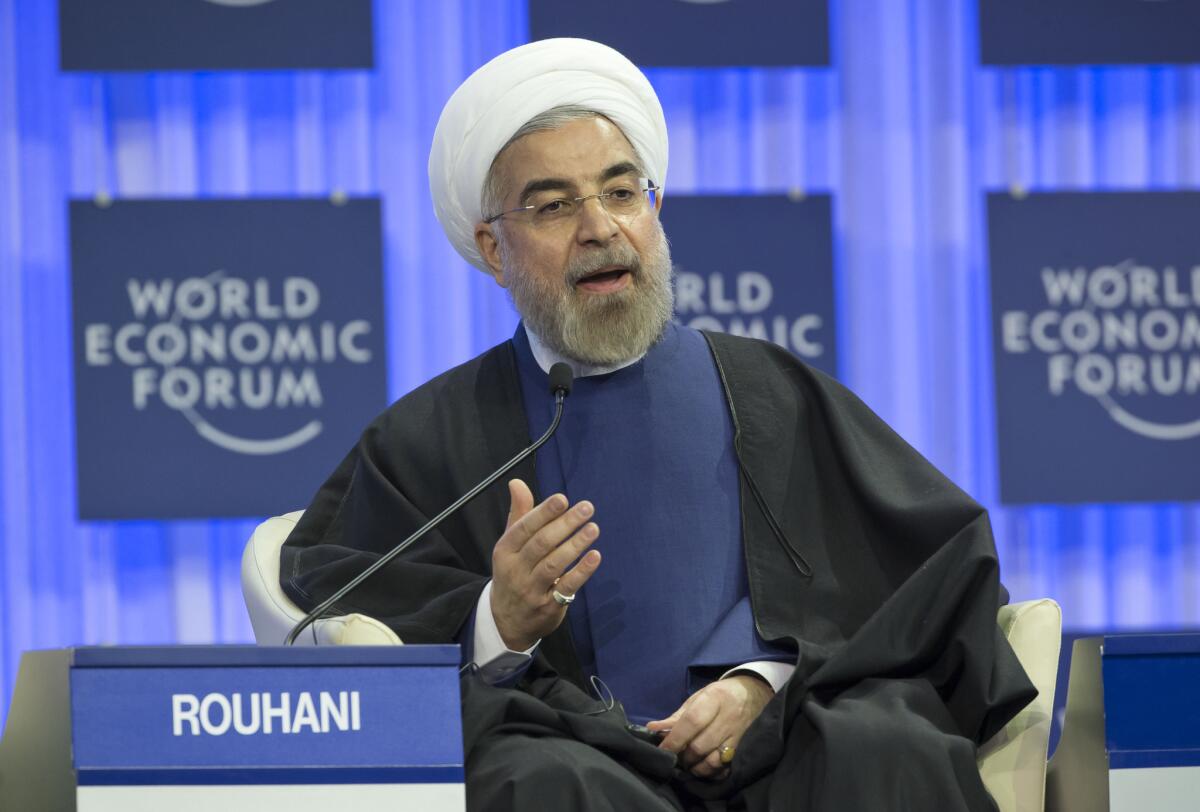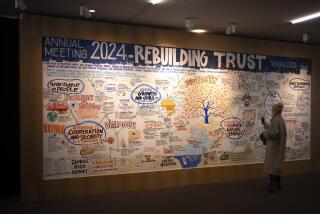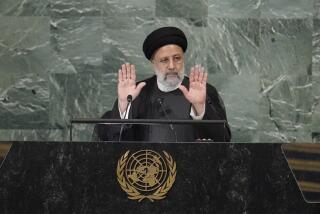Iranian President Rouhani’s trip to Davos gets good reviews at home

- Share via
TEHRAN -- Last year he took New York by storm. This week, Iranian President Hassan Rouhani continued his charm offensive at the world’s most high-profile economic summit in Davos, Switzerland.
At the ritzy Alpine resort, the Iranian leader delivered a clear message: Iran is open for business.
Rouhani touted investment opportunities in Iran, met with European oil executives and stressed Tehran’s desire to conclude a nuclear accord with world powers that could lift international sanctions.
Back home, reaction to the president’s Davos expedition have generally been positive.
Both liberal and conservative dailies have given a thumbs up to Rouhani’s Swiss excursion.
“Iran announced its readiness to interact with the world,” declared Iran, a moderate daily.
To some skeptics, however, Rouhani’s comments echoed remarks made in Davos a decade ago by then-President Mohammad Khatami. Khatami wooed the international community and tried to persuade foreign investors to return to Iran.
Many Iranians back then were hopeful of a broad democratic and economic transformation. Expectations are now largely scaled back to some marginal improvements in the nation’s faltering economy, battered by international sanctions.
“We do not want democracy now; we want jobs for our educated youth,” said Kamaran, 60, a civil engineer who asked that his last name not be used for privacy reasons.
Khatami eventually ran afoul of conservatives and left office without having accomplished the broad reforms he had promised. He was succeeded by President Mahmoud Ahmadinejad, whose combative administration was blamed for worsening Tehran’s relations with the world. Rouhani took office last year amid renewed hopes of reform.
The moderate daily Mardom Salari praised Rouhani’s remarks in Switzerland in an opinion piece titled “A different Iran.”
“Hassan Rouhani knows very well that the conduct of the previous government has tarnished the image of Iran in the world,” the column stated. “That is why he insists on behaving so well during his diplomatic visits so that the world knows that extremism has come to an end in Iran.”
Rouhani has already pushed for an accommodation with world powers on Iran’s controversial nuclear program, resulting in an interim deal with the United States and other nations. Iran has agreed to constraints on its nuclear efforts in exchange for a reduction in international sanctions.
Many analysts predict that Rouhani’s popularity will plummet should the nuclear deal fall through, dashing the public’s hopes for economic improvement.
“After his election victory last year, Rouhani is raising people’s expectations and if for any reason sanctions are not lifted and the [nuclear] deal ... fails, then we will witness a backlash of frustration,” Mohammad Reza Sabzalipour, an Iranian businessman, wrote on his website.
There was considerable buzz about Rouhani’s comment in Davos on Thursday that reopening of the U.S. Embassy “is not impossible” — a stunning statement considering the mutually hostile U.S.-Iran relations since the 1979 Islamic revolution and seizure of the embassy and 52 hostages.
Conservatives in Iran are still suspect of Rouhani’s planned opening to the West. The hard-line Kayhan newspaper noted Secretary of State John F. Kerry’s statement that the “military option” is still on the table should a nuclear deal with Iran fail. Accompanying that comment was Rouhani’s assurance: “We are not scared, we keep the resistance economy in Iran.”
Special correspondents Mostaghim reported from Tehran and Sandels from Beirut. Times staff writer Patrick J. McDonnell in Geneva contributed to this report.
More to Read
Sign up for Essential California
The most important California stories and recommendations in your inbox every morning.
You may occasionally receive promotional content from the Los Angeles Times.










